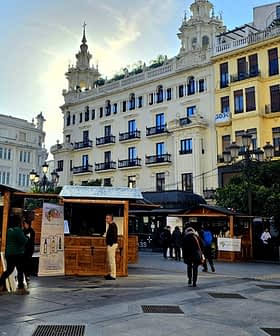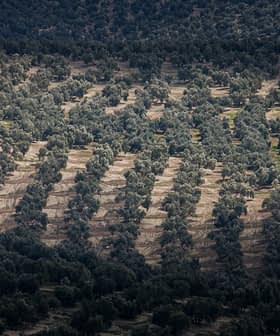Turning Olive Stones Into Decorative Furniture
Paninos, a company based in the south of Spain, takes what has traditionally been a waste byproduct of olive oil production and turned it into an additional revenue stream.
 Photo courtesy of Paninos.
Photo courtesy of Paninos.In a small town in the heart of Spanish olive country, an age-old byproduct is finding a brand new use.
Paninos, which is based in Benamejí, Córdoba, has launched an initiative to use olive stones in new and innovative ways. The company takes these stones and transforms them into furniture, including bathroom and kitchen counter tops, among other things.
The new applications would also contribute to entrepreneurial development and to create more jobs in Andalusia’s rural environment.
Spain is responsible for almost half of the world’s olive stone production. During the 2018 – 19 harvest year, the country was expected to produce nearly 800,000 tons of the byproduct, most of which is currently burned as biomass.
The project began in 2013 with the main goal of seeking new uses for these olive stones, so that they could be transformed from a waste product into an additional stream of revenue for olive growers and oil producers.
“The new applications would also contribute to entrepreneurial development and to create more jobs in Andalusia’s rural environment,” Francisco Arjona, the innovator behind these olive stone-based coatings, told Olive Oil Times.
Arjona is a technical architect and is well acquainted with the olive oil sector. He works for two companies that produce, transform and sell olive oil stones, either for biomass or to be used in other industrial processes, such as cosmetics production and biocomposites. Juan Cabello, a carpenter, has worked with Arjona on the product’s development.
The creation of Paninos olive stone coatings has been the result of a long process that began with trying to stick the crushed olive stones to wood. Once a material similar to the current coating was achieved, the inventors realized its uniqueness, versatility and aesthetic potential for decoration. The crushed stones have many possibilities in terms of textures and designs. The material is also sustainable, durable and renewable.
“What we do is spread crushed olive stones over a board to which resin has been previously applied,” Arjona said. “Once the stones are adhered, the material is sanded and the resulting surface is covered with an olive stone flour filler. The material is then sanded again and coated with a transparent varnish.”
One of the advantages of the material is that it allows for a great diversity of colors and designs. In addition to tables, kitchen or bathroom counters, Paninos is also using olive stones to create doors, frames, wall panels, worktops, and other products.
According to Arjona, the coatings have a very competitive price, considering how unique and versatile they are. He and Cabello work mostly with stones from Arbequina, Hojiblanca and Picual olive varieties, although Arjona emphasized that the variety of the olive employed is irrelevant for the final product.
In 2018 Paninos obtained a European patent for this material. This January 2019 the company will join Spain’s ICEX-Exports and Investments stand at the Maison & Objet fair, which is held in Paris, to showcase their products to potential buys from around the globe.
Paninos is also working on developing new and different kinds of products related to olive stones.








